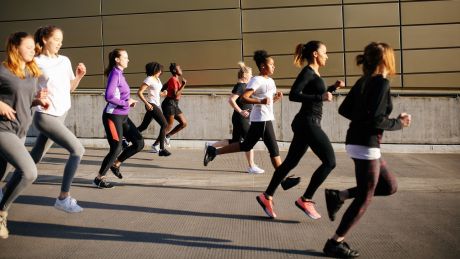Improve Your Running With This Marathon Training Advice For Women
There are differences in what men and women need to consider with their marathon training

Given that all marathon runners have to complete the same 42.2km to finish on race day, there are naturally a lot of similarities in how they train for a marathon. However, every runner is also different, and ensuring those differences are taken into account with your training is vital to producing your best performance.
Ali Nolan’s new book Master The Marathon: The Ultimate Training Guide for Women is designed to help women of all levels train for the marathon, providing access to the kind of insights elite runners enjoy.
“I wish every runner had a strength training coach, running coach, nutritionist and dietitian, sports medicine doctor, and a bunch of other random experts in their corner,” says Nolan. “So I consulted experts that I know, and tons of interviews went into the book.”
We spoke to Nolan about how marathon training is different for women, and for her advice for everyone taking on the distance.
What are the differences in marathon training for men and women?
I think that women think differently and we’re built differently. It’s obvious, in a way, that there are differences, but at the same time, they’re very small because we’re all training for the same distance.
In the book I say there are five elements of marathon training: running, strength training, nutrition, mentality and recovery. I think it’s much more important for women to home in on those other elements that aren’t running. I think women are very task-oriented and so they get the training plan done, but they neglect strength and nutrition.
One more thing for women is our hips are slightly wider and our lower extremities will be more off-balance than men’s. It’s debated in the medical community, but some people believe that that does leave women more prone to foot injuries and calf strains. So in the book, there are strength training programmes that focus on hip strength, first of all, and glute activation, then little tweaks like calf raises that will help prevent plantar fasciitis and make everything more balanced. And then, of course, a bunch on core strength, because that feeds into your bottom half.
Sign up for workout ideas, training advice, reviews of the latest gear and more.
Women also have weaker upper bodies on average, and a lot of new runners don’t realise that you use your upper body when you’re running. It’s about making sure you build that strength into the plan.
Nutrition is complicated because it’s very individualised. But every nutritionist, dietitian and sports medical doctor I talked to said in general, when marathon training, women are eating too few calories and don’t realise. So it’s waking people up and being like “no, carbs are good!” and just getting women to eat more.
Mentality-wise, I think balancing life with training leads a lot of women into burn-out while marathon training. It’s something that I’ve dealt with a lot, so a huge part of my book is about really focusing inward – trying to take an inventory of how your body feels and how your mind is feeling. That can make such a difference to your marathon training because if your mind is completely burned out, you’re not going to perform at your peak and you might be disappointed. And if you haven’t learned the skills for self compassion, which a lot of women do not have, then you’re going to get into this spiral. Maybe you quit running or maybe you run too much.
The other thing is that men have higher VO2 maxes than we do, so let’s up the speed training. That’s really for more intermediate and advanced runners – a lot of track workouts, uphill sprints and that kind of stuff.

Is it harder in general for women to join in things like track workouts with clubs?
I think it is. First of all, it’s hard to motivate yourself if you’re doing a track workout by yourself. Then if you do go to track workouts, you will find that it’s not an even split [between men and women].
Some beginner runners don’t even realise that it’s necessary when training for long-distance running, and when they figure it out and try it, it probably is intimidating at first. Especially if you’re dead last – that sucks – and if you’re a woman going to a track workout that might happen because of our differences.
I made some workouts for the book that were more fun that you can do on your own, or with one other friend. And I just encourage people to try. The running community, even if they are elite or faster, they’re so open and excited to cheer for people that are trying something new.
See related
How do you manage periods around marathon training?
For women that time of the month it is, in a very basic sense, a pain! Sometimes you just have to grin and bear it, and get through it, but I will also say that if it’s your long run day and you feel like crap, wait a day and adjust your training plan. That kind of goes for everything. If you’re not feeling your best – if you’re under the weather, or if you have cramps or a migraine – and you try to go out and do a good-quality workout, it’s going to end up being garbage miles. It’s better to wait and get those quality miles in than rush it and feel miserable. That’s not going to do anything for your confidence either.
A lot of runners nowadays totally skip it. They take birth control, because periods get in the way. The other thing I’d say about it is a lot of women runners who are very dedicated, who are maybe not eating enough calories, will begin to skip their periods. Sometimes that’s OK, as long as you talk to a doctor. Sometimes it’s really bad and can lead to osteoporosis and female triad [now more commonly known as RED-S]. I know not everybody has access to great health care, but if there’s anything wrong with your body in that way, I recommend seeing a doctor.
Are there any other marathon mistakes women in particular tend to make?
That was a question that I asked every expert. As I said, the nutritionists and dietitians said they’re not eating enough calories. Then the physical therapists, sports docs and running coaches said that most women run too fast on their long, slow runs, and their easy training miles. People should really use the pace charts and the pace apps. Plug in your 5K time and I guarantee people will be surprised to see that their slow training days should probably be like a minute a mile slower than what you’re actually running.
One other thing is that we don’t give ourselves enough time to recover – this is probably true for men too. When our plan says rest day, maybe we’ll sneak in a mile or two because it feels good, or maybe we’ll go and do a stupid high-intensity interval class. Really you should be putting your feet up and eating a nutritious meal. I don’t think people treat themselves well during marathon training.

Nick Harris-Fry is a journalist who has been covering health and fitness since 2015. Nick is an avid runner, covering 70-110km a week, which gives him ample opportunity to test a wide range of running shoes and running gear. He is also the chief tester for fitness trackers and running watches, treadmills and exercise bikes, and workout headphones.
